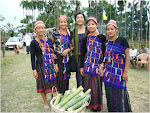
Abstract
The Tangsas are a small hill tribe who have migrated to India from Myanmar and China mostly probably within the last three centuries and have settled in the north-east Indian states of Assam and Arunachal Pradesh. Although probably of the same stock as the Nagas, the Tangsas have over time evolved into a distinct and separate ethnic group.
According to a recent count, the total Tangsa adult population in Assam is not more than 15,000. However, they do not have a common language, but speak the language of the sub-tribe to which they belong. Furthermore, since none of the Tangsa languages have a written form, most Tangsas learn to read and write in Assamese, Hindi or English.
The old Tangsa communities living in temporary settlements in remote hilly areas in earlier times were mostly hunters and agriculturalists doing shifting cultivation. But many have since moved down to the plains, hence have been forced to give up hunting altogether and have starting breeding pigs and poultry instead, and have taken to permanent wet-rice cultivation. This has brought about a drastic change in their life-styles.
The old Tangsa hill communities were mostly self-sufficient and had very little contact with the outside world. Recent governmental efforts towards development of infrastructure, mainly in the form of better roads and a better communication network, have made these remote areas more accessible. Better facilities for education, increasing exposure to the pan-Indian culture through cinema and television, better prospects for employment and better connectivity with the outside world has meant that the younger generation of Tangsas are slowly opting for the new ways over their own traditional life-styles. This has resulted in a massive loss of cultural and traditional knowledge in the past 3-4 decades.
Finally as a result of intense missionary activity in north-east India, many Tangsas have converted to Christianity in recent times . This has, in many cases, implied giving up almost completely their old cultural traditions, and this has further aggravated the loss of traditional knowledge.
However, many of the educated Tangsas are now slowly waking up to the realisation that in trying to become modern and Christian they have also endangered their own distinct identity as an ethnic group. The past two decades have seen intense efforts, in some of these sub-tribes at least, to recover or reinvent their own traditions and culture – with some surprising and unexpected consequences.
In this paper I wish to investigate some of these consequences in the light of the social, cultural, linguistic and environmental background of the Tangsas on the one hand, and the rapid changes – economic, cultural and structural – taking place all around them on the other. Language, more explicitly, multilingualism, will be shown to be the thread of continuity and the crucial factor which could unite the old and the new worlds of the Tangsas and secure their identity in the future.
Monday, 4 January 2010
The Tangsas in Assam – in quest of a new identity in an altered world
Subscribe to:
Post Comments (Atom)

Awesome elaboration. I wish if you could write at our blog www.assamportal.com .
ReplyDelete